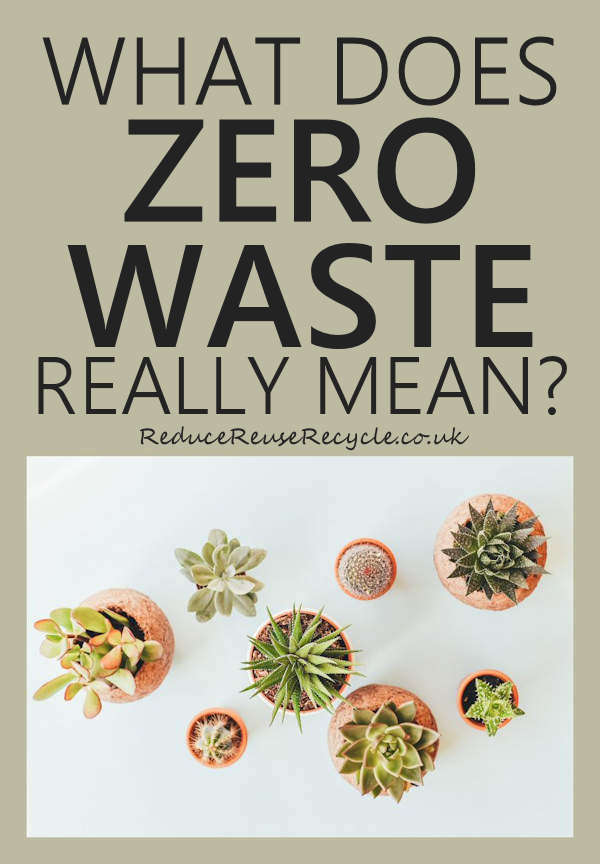What Does Zero Waste Mean?

Image Credit: Annie Spratt
The concept of Zero Waste has become very fashionable in the last few years, but what does that really mean?
What Is Zero Waste
Let's start with the definition from the Zero Waste Alliance, which is an organisation that promotes positive alternatives to landfill and incineration and which raises community awareness of the social and economic benefits to be gained when waste is regarded as a resource base upon which can be built both employment and business opportunities.
“Zero Waste is a goal that is ethical, economical, efficient and visionary, to guide people in changing their lifestyles and practices to emulate sustainable natural cycles, where all discarded materials are designed to become resources for others to use.
Zero Waste means designing and managing products and processes to systematically avoid and eliminate the volume and toxicity of waste and materials, conserve and recover all resources, and not burn or bury them.
Implementing Zero Waste will eliminate all discharges to land, water or air that are a threat to planetary, human, animal or plant health.”
So basically zero waste is a few steps further than just Reduce Reuse Recycle; it is a design philosophy which means that every product that is made should be designed from the outset with its final disposal in mind, including the packaging that it comes in.

So, What Is A Zero Waste Lifestyle?
However when most people use the phrase 'zero waste', what they actually are thinking about is a zero waste lifestyle - the sort of lifestyle esposed by zero waste bloggers and aspirational zero waste Instagrammers.
If the term zero waste conjures up images of empty white-wallled apartments and a tiny jar containing a years worth of rubbish, welcome to the club; this is what the term has come to mean in the public conciousness.
A zero waste lifestyle is one where you try to minimise your impact on the environment by avoiding single use items (of any type, not just plastic) reusing and repairing items rather than replacing and buying items secondhand.
A lifestyle with absolutely no waste is pretty difficult in our modern world - as I was writing this, a glossy free magazine and a plastic bag containing a plastic charity collection sack was pushed through my letterbox (sigh).
Many zero waste bloggers receive abuse and ridicule for every single perceived deviation from the cause of simply producing no trash, and assumptions are made about their lifestyle, for example that because they call themselves 'zero waste' that automatically are anti-plastic in any form.
How To Move Towards A Zero Waste Lifestyle

Image Credit: Filip Zrnzević/ReduceReuseRecycle.co.uk
The most important thing to remember is that every little helps.
Every time you choose to purchase something recycleable, compostable, something that is built to last, a product with little or no packaging, or opt for an item with recycleable or compostable packaging rather than plastic, you are helping.
Even the doyenne of the movment Bea Johnson, author of Zero Waste Home, only refers to getting close to zero.
Change takes time and you may have false starts and make mistakes when trying to live a zero waste lifestyle, but keep trying, every choice that you make sends a message to manufacturers and retailers that consumers do want to buy products that make as little impact as possible on the environment.
In turn this will encourage manufacturers to design their products in line with the zero waste philosophy outlined in the Zero Waste Alliance's definition.
Read More
- 10 Easy Zero Waste Swaps You Can Make Today
- Alternatives To Fossil Fuels
- How To Recycle Coffee Pods and Capsules
What's New
- Environmental Days In February 2026
- Free Water Saving Devices For UK Residents
- STOP! Don't Put That In The Recycling!
- 21 Free Online Games About The Environment For Kids
- Best Plastic-Free Wet Wipes 2026
Most Popular in Recycling
CDs & DVDs
Videotapes & Cassettes
Duvets & Pillows
Ink Cartridges
Shredded Paper
Stamps
......Recycling A-Z
